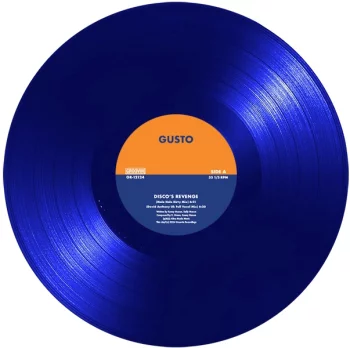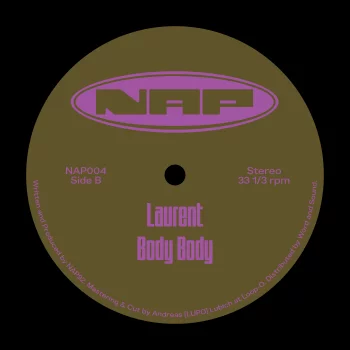1
Raphael Roginski - Blue Train
2
Raphael Roginski - Equinox
3
Raphael Roginski - Lonnie's Lament
4
Raphael Roginski - Walkers With The Dawn
5
Raphael Roginski - Mr. P. C.
6
Raphael Roginski - Countdown
7
Raphael Roginski - Rivers
8
Raphael Roginski - Grand Central
9
Raphael Roginski - Seraphic Light
10
Raphael Roginski - Naima
11
Raphael Roginski - Pursuance
12
Raphael Roginski - Spirituals
13
Raphael Roginski - Love
14
Raphael Roginski - Promise
Raphael Roginski’s "Plays John Coltrane & Langston Hughes" is an expanded reissue of his 2015 album, previously unreleased on vinyl and long out of print on CD. It has only grown in stature over the years, for Roginski’s solo guitar interpretations – or reimaginings – of John Coltrane, which draw on the guitarist's unique and immediately recognizable style, rooted in jazz, blues and global folk idioms.
Part of a series called Populista, the album was originally released by Warsaw imprint Bôlt Records. Curator Michal Libera describes the series as “dedicated to mis- or over-interpretation of existing music”. Roginski’s "Plays John Coltrane & Langston Hughes" fits perfectly into the concept, given the distance that the guitarist travels from the original form of Coltrane’s compositions, although, as Libera notes, it was “simply handed to me as a finished work”.
Approaching Coltrane's singular, spirited music with a perspective formed outside the jazz tradition, Roginski slowed the songs down, extracting polyphonic tensions, and striving for an intimacy and mysticism that transcends genre. The way the music turned out struck the guitarist as a revelation. “Suddenly these songs became full of glowing moving pictures, with a melancholy, but also with something like promise,” he says.
Roginski says, “At that time, I lived in an apartment with the branches of a fig tree growing into it. I sat in 35-degree heat under its leaves, on the carpet, and discovered the polyphony of this music. I met a broken person on the street around this time. She moved in with me for a few days, a victim of an ultra-religious family from which she had escaped. She slept on the couch all day, recovering, and I started playing. As if for her. I had to breathe light into her life and I did what I do best, and that is how this music came into being.”
The album also includes two tracks drawing on poems by Langston Hughes, a central figure of the Harlem Renaissance of the 1920s and ’30s, and one of the innovators of jazz poetry. Roginski’s long-standing interest in mystical experiences across cultures brought him to the Hughes poems he pays tribute to, poems he says are “full of brilliance and goodness”. The line “I’ve known rivers: ancient, dusky rivers” makes an implicit connection with the images of flowing water and the Black Sea that run through Roginski’s later album "Talàn", as well as the lakes of the Polish-Lithuanian borderlands in "Žaltys". Roginski’s singular musical vocabulary is guided by an abiding belief in the interconnectedness of all things.
The expanded reissue includes four new tracks recorded in Warsaw in the summer of 2024, years after the original recordings, yet reaching back to the concept of radically reinterpreting the work of Coltrane. Roginski’s playing has subtly shifted, imbued now with an even deeper gentleness and intimacy that echoes "Talàn". As always, the playing is dazzling, recorded solo without overdubs. The idea for the new tracks came from Roginski himself; one suspects that he could play and reinterpret this music endlessly, and he recorded them after a marathon stretch of 52 concerts in three months. “Playing live strengthens what we do in the studio,” Roginski says. “There is even more light now in these songs.”
The cover of the reissue features three paintings from Marcin Janusz’s larger work "Kalendarz 2023", connecting it visually to Roginski’s album Žaltys, released earlier this year by Unsound.
Sicherheits- und Herstellerinformationen / safety and manufacturer info (GPSR)
WAS - Word and Sound Medien GmbH
Liebigstrasse 2-20
DE - 22113 Hamburg
Germany
Contact: [email protected]More
Part of a series called Populista, the album was originally released by Warsaw imprint Bôlt Records. Curator Michal Libera describes the series as “dedicated to mis- or over-interpretation of existing music”. Roginski’s "Plays John Coltrane & Langston Hughes" fits perfectly into the concept, given the distance that the guitarist travels from the original form of Coltrane’s compositions, although, as Libera notes, it was “simply handed to me as a finished work”.
Approaching Coltrane's singular, spirited music with a perspective formed outside the jazz tradition, Roginski slowed the songs down, extracting polyphonic tensions, and striving for an intimacy and mysticism that transcends genre. The way the music turned out struck the guitarist as a revelation. “Suddenly these songs became full of glowing moving pictures, with a melancholy, but also with something like promise,” he says.
Roginski says, “At that time, I lived in an apartment with the branches of a fig tree growing into it. I sat in 35-degree heat under its leaves, on the carpet, and discovered the polyphony of this music. I met a broken person on the street around this time. She moved in with me for a few days, a victim of an ultra-religious family from which she had escaped. She slept on the couch all day, recovering, and I started playing. As if for her. I had to breathe light into her life and I did what I do best, and that is how this music came into being.”
The album also includes two tracks drawing on poems by Langston Hughes, a central figure of the Harlem Renaissance of the 1920s and ’30s, and one of the innovators of jazz poetry. Roginski’s long-standing interest in mystical experiences across cultures brought him to the Hughes poems he pays tribute to, poems he says are “full of brilliance and goodness”. The line “I’ve known rivers: ancient, dusky rivers” makes an implicit connection with the images of flowing water and the Black Sea that run through Roginski’s later album "Talàn", as well as the lakes of the Polish-Lithuanian borderlands in "Žaltys". Roginski’s singular musical vocabulary is guided by an abiding belief in the interconnectedness of all things.
The expanded reissue includes four new tracks recorded in Warsaw in the summer of 2024, years after the original recordings, yet reaching back to the concept of radically reinterpreting the work of Coltrane. Roginski’s playing has subtly shifted, imbued now with an even deeper gentleness and intimacy that echoes "Talàn". As always, the playing is dazzling, recorded solo without overdubs. The idea for the new tracks came from Roginski himself; one suspects that he could play and reinterpret this music endlessly, and he recorded them after a marathon stretch of 52 concerts in three months. “Playing live strengthens what we do in the studio,” Roginski says. “There is even more light now in these songs.”
The cover of the reissue features three paintings from Marcin Janusz’s larger work "Kalendarz 2023", connecting it visually to Roginski’s album Žaltys, released earlier this year by Unsound.
Sicherheits- und Herstellerinformationen / safety and manufacturer info (GPSR)
WAS - Word and Sound Medien GmbH
Liebigstrasse 2-20
DE - 22113 Hamburg
Germany
Contact: [email protected]More




